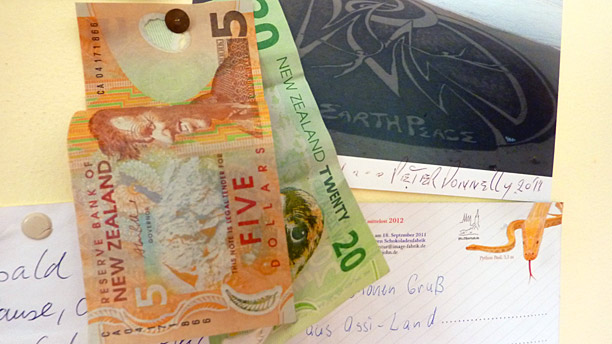

It is not about the fact that Pinterest particularly encourages people not to ponder about the implications of copyright but that it uses the social dynamics of „what-do-I-care-if-anyone-else-shares-it“ attitude combined with the effective features of the internet for fast viral dispersion of any kind of content.
Anyway, it raises the question about the legal implications for the user when Pinterest states some things in its TERMS OF USE: If a user uploads content, he agrees to grant a non-explicit but comprehensive royalty-free-licence of the work to the platform. Of course, this is the only way to ensure for the company (Cold Brew Labs) the use of user generated content – where it not differs from other social media platforms. But it seems before Pinterest sharing was never that easy. Even content that was uploaded without the right to do so. As soon as an image, for instance, is uploaded to Pinterest, the Uploader guarantees by Pinterest’s T&Cs to hold the right of ownership. If he does not, he becomes liable („solely responsible“) to any third-party claims. That sounds right, but what does Pinterest do to keep people aware of their responsibilities? Not much apart from the Terms and Conditions and therefore the fact that humans (above 13 years) have to rely on their own maturity.
Truth be told, it’s an empiric and psychologic fact that people share kind of a wild-west mood in the internet. In other words, there is that attitude that lets people think that, if someone uploads some work of their own into the cloud, it’s there for all to spread and use. Is it?
And this is the same attitude with which banks and credit card companies do business: attract people by making the process of stepping into contracts easy by dissipating concerns and issues that contracts arise. It’s the use of the fineprint that nobody reads but leave the contractual consequences to the client and his majority.
The same approach is used by social sharing platforms that give freedom of expression – even if consequences bear the threat of violating copyright laws. How reliable, for example, are those Pinterest-users that already shared that ripped image a thousand times?
It’s obvious that a big industry out there tries to prevent the „pirating“ to keep their revenue and influence in order. Whereas on the other hand, the „pirates“ are not the common people using the internet and its possibilities but these are the ones effectively affected by all laws the lobby oppresses bit by bit. Pinterest, however, is one of the platforms that do not want to breach intellectual property laws but is subtly pushing it by making copying easy. It delivers the user to the legal system as he signed the contract virtually taking all responsibility for his actions. Therefore all that’s left to say is nothing but a reminder: To stay aware that even in the wild west your actions had some (unforeseen) consequences.
Das System benutzt die erfolgreiche Strategie anderer Social-Media-Kuratierungsplattformen: Es erlaubt Nutzern das Teilen und Sammeln von jeglichen Inhalten im Netz. Technisch macht es das Kopieren und Kommentieren von Informationen durch die „Pin“ und „Repin“ Funktionen äußerst benutzerfreundlich. Der Begriff „Informationen“ verstreut hier recht akkurat die juristische Unschärfe, auf welche ich beim Teilen von Inhalten hinaus will.
Aus der allgemeinen Auffassung, das Internet sei das Mittel zur Kommunikation, zur Aufklärung und Wissensschöpfung, werden Bewegungen wie jene Anti-ACTA ins Leben gerufen. Wir Deutschen kennen unsere Rechte, besonders jene über die Informationsfreiheit, Art. 5 I, II GG. Doch wo ist der rechtliche Unterschied einer Plattform wie Pinterest zu „Megaupload“?
Schließlich werden Bilder und Videos von Webseiten „heruntergepinnt“ und weiter von einem Nutzerprofi in das nächste kopiert. Die Allgemeinen Nutzungsbedingungen des Pinterest-Service enthalten einen Absatz über Nutzerinhalte, wonach der Nutzer mit dem Heraufladen seiner Inhalte weitgehende Nutzungsrechte daran an Cold Bew Labs überträgt. Das erfaßt per legem und per logeum jedoch keine Werke, die von vornherein nicht vom Urheber stammen. Pinterest kann sich keine Nutzerrechte von nicht bestehender Urheberschaft ableiten. Das Risiko der Haftung bei Urheberrechtsverletzungen geht immer der Nutzer ein, also auch derjenige, welcher innerhalb Pinterest weiterverbreitet.
Die Mentalität im Internet entspricht weitgehend – ich behaupte, als empirischer und psychologischer Fakt – der des Wilden Westens. In der Weite der neuen Welt mag es Regeln geben – aber sie sind weder in klare Worte gefaßt, noch sind die Gesetzeshüter omni-present. Das Konsumieren von Informationen, seien es Texte, Bilder, Videos oder Musik, die jemand ins Netz gestellt hat, ist Sinn und Zweck des Internet für den Konsumenten. Das sind wir alle. Hand auf’s Herz – insbesondere bei weniger bekannten, privaten Medien fällt uns das Kopieren und Weiterverbreiten leicht, denn „der hat es ja in’s Netz gestellt.“
Die wichtigste .. zur Nutzung von Sozialen Netzwerken, die das Verbreiten von Informationen und Werken erlauben, ist die Tatsache, daß alle Betreiber solcher Plattformen die rechtliche Verantwortung (die Haftung) auf den Nutzer übertragen. Drohen rechtliche Konsequenzen, ist es immer der Nutzer, der aufgrund seiner Mündigkeit haftet. Er hat die Nutzungsbedingungen immerhin akzeptiert. Seien Sie ehrlich zu sich selbst: Haben Sie die Nutzungsbedingungen von facebook, Google, Apple oder Pinterest gelesen?
Ein juristischer Leitfaden zu rechtlichen Konsequenzen der Nutzung von Pinterest findet sich bei meine Kollegen Thomas Schwenke auf Spreerecht.de – und er empfiehlt Pinterest-Nutzern, schon mal Geld an die Wand zu pinnen – für die kommende Abmahnwelle.

